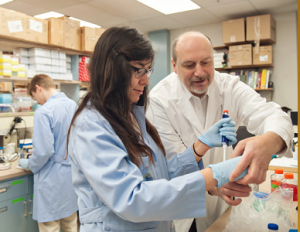Presented By: Michigan Medicine
What does the future hold for bioscience training?
Plenary session of the Future of Bioscience Graduate and Postdoctoral Training workshop

Today’s graduate students and postdoctoral fellows in the biomedical sciences face a far different career landscape than their professors once did – and their successors will see even more change.
A plenary session on the morning of Monday, May 4 will address the causes, effects and potential solutions for these imbalances in career opportunities. It’s part of a three-day workshop on the Future of Bioscience Graduate and Postdoctoral Training, convened by U-M leaders, that will bring more than 250 bioscience education leaders to campus that week.
Though the workshop is full, the plenary session is open to all. It will begin at 9 a.m. in the Rackham Auditorium of the Rackham Graduate School building, 915 E. Washington St. and will end at noon. Coffee and refreshments will be served at 10:30 a.m.
U-M President Mark Schlissel, M.D., Ph.D., will speak, followed by distinguished leaders in the field:
• Gregory Petsko, D. Phil., Professor of Neurology at Weill Cornell Medical College
• Keith Yamamoto, Ph.D., Professor and Vice Chancellor and Research Executive Dean at the University of California, San Francisco School of Medicine
• Patricia Labosky, Ph.D., of the Office of Strategic Coordination in the Director's Office of the National Institutes of Health
• Richard Boone, Ph.D., Deputy Director of the Graduate Division and NRT Program Officer at the National Science Foundation
Janet Weiss, Ph.D., the dean of Rackham, will moderate.
The speakers will outline the perceived problems and some of the potential solutions already proposed, including innovative training programs supported by NIH and NSF.
Attendees at the workshop include representatives of academic institutions, funding agencies, trainees, scientific societies and other interested individuals, to discuss possible solutions to the career imbalances that have developed in the biomedical workforce.
The plenary session will be live-streamed on the web and an online video will be available after the event.
Visit http://www.rackham.umich.edu/fobgapt for more information and video links.
On Twitter, follow and use the hashtag #fobgapt during and after the event.
The workshop is sponsored by the Office of the President, the Office of the Provost, the Rackham Graduate School and the Medical School, including the Endowment for the Basic Sciences and the basic science departments. Additional support comes from the NIH-sponsored Broadening Experiences in Scientific Training (BEST) program at Wayne State University.
A Michigan Meeting on this topic is planned for 2016; more information will be available later in 2015.
A plenary session on the morning of Monday, May 4 will address the causes, effects and potential solutions for these imbalances in career opportunities. It’s part of a three-day workshop on the Future of Bioscience Graduate and Postdoctoral Training, convened by U-M leaders, that will bring more than 250 bioscience education leaders to campus that week.
Though the workshop is full, the plenary session is open to all. It will begin at 9 a.m. in the Rackham Auditorium of the Rackham Graduate School building, 915 E. Washington St. and will end at noon. Coffee and refreshments will be served at 10:30 a.m.
U-M President Mark Schlissel, M.D., Ph.D., will speak, followed by distinguished leaders in the field:
• Gregory Petsko, D. Phil., Professor of Neurology at Weill Cornell Medical College
• Keith Yamamoto, Ph.D., Professor and Vice Chancellor and Research Executive Dean at the University of California, San Francisco School of Medicine
• Patricia Labosky, Ph.D., of the Office of Strategic Coordination in the Director's Office of the National Institutes of Health
• Richard Boone, Ph.D., Deputy Director of the Graduate Division and NRT Program Officer at the National Science Foundation
Janet Weiss, Ph.D., the dean of Rackham, will moderate.
The speakers will outline the perceived problems and some of the potential solutions already proposed, including innovative training programs supported by NIH and NSF.
Attendees at the workshop include representatives of academic institutions, funding agencies, trainees, scientific societies and other interested individuals, to discuss possible solutions to the career imbalances that have developed in the biomedical workforce.
The plenary session will be live-streamed on the web and an online video will be available after the event.
Visit http://www.rackham.umich.edu/fobgapt for more information and video links.
On Twitter, follow and use the hashtag #fobgapt during and after the event.
The workshop is sponsored by the Office of the President, the Office of the Provost, the Rackham Graduate School and the Medical School, including the Endowment for the Basic Sciences and the basic science departments. Additional support comes from the NIH-sponsored Broadening Experiences in Scientific Training (BEST) program at Wayne State University.
A Michigan Meeting on this topic is planned for 2016; more information will be available later in 2015.